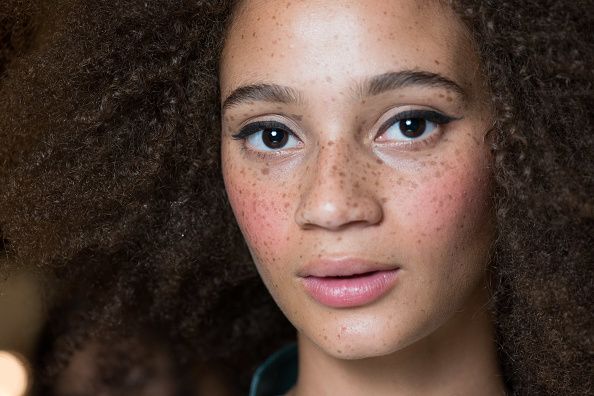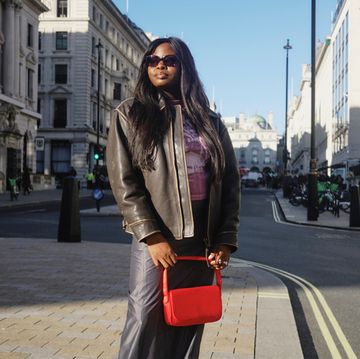You've always said that when the time comes, you're going to age gracefully. But did you know that certain lifestyle factors, not to mention environmental aggressors, silently contribute to the skin's ageing process day by day?
Skipping sleep and eating sugar are just a handful of obvious ones, and while we may have less control over things such as pollution and UV rays there are some things you can do to help slow down the effects.
1. Increased Sun Exposure
According to skin experts, up to 80% of ageing signs are due to environmental factors and sun exposure is one of the worst, which means it's more important than ever to apply a sunscreen on sun-exposed areas such as the face and neck (after serum and moisturiser) and on your hands. Yep, really.
What It Looks/Feels Like: Redness, peeling, pigmented spots, wrinkles and rough skin.
Slow It Down: Your best bets are to avoid soaking up the sun as much as you can (sorry, beach bums) and to stock up on the SPF. If you're prone to spots, choose a sunscreen that comes in a lightweight gel or lotion form - such as the Vichy Ideal Soleil Anti-Blemishes Mattiying Coorective Care SPF 30 - as it's less likely to clog pores. If you have dry skin, we suggest the Vichy Slow Âge Cream Moisturiser, which acts like shield against skin-slackening rays throughout the day.
2. Not Pollution-Proofing Your Skincare
You might not be able to spot free radicals like pollution and bacteria with the naked eye, but they have the ability to embed themselves into your skin.
What It Looks/Feels Like: A dull complexion zapped of radiance.
Slow It Down: Look for skincare products rich in antioxidants such as baïcalin, found in Vichy's Slow Âge skincare range. They act like an apron against environmental aggressors and stops them from penetrating the skin - like a little army of skin-friendly ingredients fighting your complexion's corner throughout the day.
Oh, and listen up, make-up obsessives. You should really avoid touching up concealer, foundation, bronzer and blusher as the day goes on, as this could push pollutants further into the skin. Not cool.
3. Not Getting The Right Amount Of Sleep
Studies suggest that not catching enough Zs can make us look significantly older than we are and that's because sleep allows the skin to take a pause from external aggressors and have time to re-set itself. A lack of sleep can also raise the level of stress hormone cortisol, which contributes to premature ageing, so yes, you'll want to think twice before you enable Post-Play and your favourite TV series gone 11pm...
What It Looks/Feels Like: Lacklustre skin, dark circles and sometimes breakouts.
Slow It Down: If you struggle to drop off, exercising a few hours before bed could work wonders. Easier said than done but it's also a good idea not to look at your phone an hour before getting cosy, as the blue light can make it harder for you to switch off. Try and grab at least seven hours sleep a night.
4. Lack Of A Consistent Skincare Routine
Lazy girls, it's time up step up your beauty game, because having an inconsistent morning and evening skincare routine is detrimental to your skin's healthy appearance for a number of reasons.
What It Looks/Feels Like: Sometimes dull, congested skin, especially if you aren't cleansing properly.
Slow It Down: Maintaining great skin doesn't have to take ages or cost the earth. In fact, sometimes, it's best to keep your routine simple with a cleanser and a moisturiser. Thanks to its light-as-air texture, the Slow Âge Fluid Moisturiser is great for those with combination to normal skin, while the Slow Âge Moisturiser Cream is fantastic at hydrating parched patches in dry skin types. Cleansing your skin thoroughly (especially in the evening) to rid it of make-up particles and pollutants is such an important step, too. The Vichy Purete Thermale Fresh Cleansing Gel works wonders to dislodge grime in seconds.
5. Eating Too Many Sugary Foods
Studies show that consuming excess amounts of sugar can feed inflammation in the body and it isn't long before the effects creep up on your face. Essentially, it's all down to enzymes produced by the process, which work to break down collagen and elastin, zapping your skin of its youthful plumpness.
What It Looks/Feels Like: "Collagen and elastin provide the skin with a support structure," says consultant dermatologist and British Skin Foundation spokesperson Dr. Anjali Mahto, which can potentially result in sagging and wrinkles. Think of your skin like a balloon - you don't want it to look deflated, right?
Slow It Down: Even though you can't see it, there is often sugar added to bread, flavoured waters, tinned soups and breakfast cereals, so it's a good idea to download a clever app like NHS Be Food Smart, which shows you how much sugar is added to packaged foods simply by scanning the bar code. Healthy adults should be consuming no more than 30g of sugar per day (approximately 4 teaspoons) and stocking up on foods rich in skin-perfecting vitamin A, like spinach and carrots. So much cheaper than retinol.
6. Cleansing Your Face Too Often
"Over cleansing the skin is likely to directly lead to premature or accelerated skin ageing," says Dr. Mahto, "and it could disrupt the skin's delicate barrier." So how often should we consult the cleanser?
What It Looks/Feels Like: Dry and irritated skin.
Slow It Down: Firstly, choose a cleanser depending on your skin type – a gel is best for those will oily skin while a cleansing milk is ideal for sensitive skin. Cleanse twice a day – once in the morning before applying moisturiser and make-up, and once in the evening after removing make-up. For a fresh and flawless complexion, take at least a minute to really massage the cleanser into your skin using your fingertips.
And the temperature of the water matters, too. Warm or tepid is best as anything hotter could potentially be too harsh for the skin.
7. Not Removing Your Make-Up Properly Before Bed
Even though we're all guilty of it after a long day at work or a few glasses of wine, falling asleep in your make-up is a complete no-no. 'Make-up has the tendency to form an occlusive barrier in the skin', mentions Dr. Mahto, so blockages can happen often.
What It Looks/Feels Like: Skin laden with blemishes and sometimes breakouts. Dullness.
Slow It Down: Using a cotton pad, swipe a gentle make-up remover over your face to dislodge surface debris first (do this until the cotton pad comes back clean) but always be sure to follow with a wash-off cleanser to make sure your skin is completely free from grime or make-up particles before you hit the pillow. And if you're absolutely exhausted? Using a face wipe is better than nothing.
Thanks to factors like pollution, UV rays and stress, it's pretty difficult to fight modern life itself, but it's so easy to protect your skin from it - and Vichy's Slow Âge skincare range does exactly that. It's time to slow down and age well.
Life proof your skin with Vichy's Slow Âge range and visit Vichy to discover more.

















